
The boundless promise.
Feng Ren is a Gushi/骨仕, an enigmatic, lethal sworn blade whose sole reason of existence is to protect the coveted Wuliang/无量/Boundless Heart Sutra. He intercepts a blind boy Po Xiao, who may just be a decoy or may be the true custodian of the Wuliang Heart Sutra and together, they flee the city. On their perilous journey they learn each others secrets. Underneath all the half-truths and deceptions between them, an inexplicable bond, an unspoken shared understanding and trust grows between then. For such a short length story, the actors' chemistry and the depth and complexity of emotions they conveyed shook me. Every twist deepens their bond and the boundless promise they make to each other. The important message of this story is that with great power, comes great responsibility. This is dark and heartbreaking wuxia but the break of dawn that pierces the darkness is blinding and immensely powerful.Everything about this movie smacks of Guo Jingming's fabulous taste and hallmark aesthetics. If like me, you watch this after My Journey To You, it is quite clear that the drama expands upon many ideas in terms of style, plot and character design from this 37-minute movie. Feng Ren makes me think of Han Yasi and Po Xiao of Xue Gongzi. The narrative also explores how best to deal with a weapon of unaparallelled power. Due to its short length, the plot is tight with no unnecessary digressions and everything comes to a full circle at the end. It perfectly illustrates the power of a short story in how it captures the heart and the imagination with all that is left unsaid and untold. This is a simple, well executed plot that is a must watch and one that I am happy to rate 8.5/10.
Was this review helpful to you?
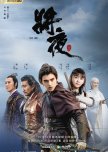
Beware of false prophets.
Ever Night is an epic fantasy adventure hit set in a mystical, ancient world where the balance of power between rival kingdoms is maintained with the aid of powerful warlords and cultivator sects. The vivid stunning palette is infused with an ominous sense of dark prophecy. The soothsayers warn that the child of darkness will bring an ice age or ever night and chaos to the world.The main protagonist Ning Que makes an thrilling debut as a lethal, almost ferally vicious warrior in a ferocious, spectacular desert ambush. This opening sets the tone for some of the most exhilarating and well choreographed fight scenes that Chinese drama has to offer. The drama is visually spectacular and delivers on the hype on many fronts, especially in terms of its movie quality production values. The sweeping breadth of the story can be overwhelming in the sheer number of characters representing different kingdoms and sects that makes the story appear more complicated than it really is. This is really the story of Ning Que (and by extension Sang Sang's) quest for revenge that sets him on an epic journey to become one of the strongest cultivators in Haotian.
Ning Que is an anti-hero. He is ruthless, cunning, manipulative and can be quite dishonourable. While at at times Chen Feiyu's acting could do with some polishing, he is superbly cast as Ning Que. He emanates that simmering resentment and burning thirst for vengeance that propels Ning Que to prevail against overwhelming odds and superior foes. With his lithe powerful build, his combat scenes are bloodthirsty and violent and his facial expressions are vicious, almost feral. Ning Que's arch-rival the glorious Prince Longqing is an interesting mirror character on a parallel path that makes different choices at important milestones along the way. What is quite remarkable about this story is there are no outright villains. The world they exist in is cruel and fraught with peril and conflict among competing interests. Thus both the antagonists and protagonists have to do ruthless, even terrible things to survive.
Unlike others, I am not troubled by the relationship between Sang Sang and Ning Que. They have no blood ties, they are simply found family and have a complex and multi-layered relationship that is likely predestined. In fact, I think it is inevitable where the relationship must go. As much as I enjoy their undeniable chemistry and clear bond immensely, to me the real issue is that Chen Feiyu and Song Yiren should never be cast together in a romantic capacity. Chen Feiyu is exceptionally tall and Song Yiren is exceptionally petite. Her youthful features and small size makes her look like a child next to him. This visual imprint is so strong it is practically impossible to imagine them as a couple. Their relationship in Season 1 remains platonic and is not troubling but it is a good thing that Wang Hedi replaces Chen Feiyu as Ning Que for Season 2.
In terms of storytelling, there are issues with pacing and the breadth and depth of the character and world building is perhaps overly ambitious in scale. Even though I love how there are different schools of cultivation and cultivators are able to gain immense power via different theologies and practices, I find the excessive pontification and philosophical discourses mind numbingly boring. That said, I appreciate the ultimate irony of how many powerful cultivators are ruled by superstition and fear of ever night or the child of darkness. While the worthy ruler and the true wise men know to beware of false prophets. The political arcs are not that interesting and Princess Li Yu and her brother don't add to the plot. They just take up space and despite all the screen time, this and several other sub plots like the inner politics of the West Shrine and Yan State go absolutely nowhere. Obviously this lays the back story for multiple (?) seasons but unfortunately none of these sub plots and characters are interesting enough to make me want know what happens to them.
Despite the digressions and morass in the middle, the drama builds towards a very strong ending. I was truly moved by Ning Que's speech when he finally confronts his family's killer and I was really impressed by Chen Yufei's acting in that moment. "Why does it always have to be a prince?" is one of the best, most memorable lines from this show. The build up in tension, that sense of dread and hope into the ending confrontation is superb. The final fight scene is epic, full of surprises, utterly savage, desperate, exhilarating. It was everything I didn't even know I was craving for. Even the CGI is amazing.
I thoroughly enjoyed many aspects of this heroic saga and I am happy to recommend this as a not to be missed drama for action and adventure buffs. But unfortunately there are many parts of it that I did not enjoy and I feel strongly that the production over indulged in laying the backstory for many subplots that only play out in subsequent seasons. I am going to go with an 8.5 because the production values and fight scenes are exceptional. Going purely on storytelling alone however, this is at best an 8.0.
Was this review helpful to you?
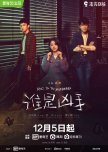
Cop out.
Despite a strong start, Who is the Murderer? deflates into yet another over-hyped and ultimately mediocre production in the 2021 Mist Theatre (soon to be known as Miss Theatre) lineup. This kind of simple and straightforward plot around the hunt for a long hidden serial killer relies heavily on good execution to impress. I don't know if it is an indictment of the competence of the Chinese police force but practically every Chinese crime thriller revolves around a stone cold case and the lamentably long road to justice.The lives of the three main characters collide when young Xiamu's foster mother is murdered by a serial killer. A fatal moment of weakness by then newbie cop Leng Xiaobing enables the murderer to escape with collateral damage. Teenage Shen Yu's father disappears without a trace after appearing near the scene of the crime. Seventeen years later, the revival of this cold case entangles Shen Yu, Xia Mu and Xiaobing, united by the scars from the past yet divided by different and at times conflicting agendas. Without a doubt all three leads deliver stellar performances as characters who all experience a shattering personal loss from this common event which shapes them in very different ways. Overall I found Xiao Yang's portrayal of the gruffly amiable but subtly guilt ridden Leng Xiaobing most natural and convincing. While both Zhao Liying and Dong Zijian delivered intense and very well acted portrayals of Shen Yu and Xia Mu, they erred on the melodramatic side with excessive posing.
One of the big issues with this drama is that the suspense does not arise from the plot itself but is heavily contrived, induced by background music that accompanies angsty and heavy dark posturing by both Xia Mu and Shen Yu that goes absolutely nowhere. While compellingly acted Xia Mu's PTSD is out of proportion to the trauma he experienced and after a lot of build up and suggestive behavior, this character just gets side-lined and he is bafflingly short changed in the final showdown even though he is on the scene. While Zhao Liying's impressive portrayal of the cold, creepily inscrutable and sociopathic Shen Yu exceeded my expectations, the plot again simply fails to rise to the occasion when it comes to her story either even though she hogs the final confrontation. At the end, I feel both characters led me on a merry chase, teasing with suggestive dialogues and actions that ultimately never fully plays out. It is very frustrating because this setup and the story could have gone down many more intriguing paths with thrilling and shocking outcomes but after setting it all up, the writer pulls a much bigger cop out on us than Xiaobing's pivotal gun shy moment.
Reminiscent of The Pavilion, the plot gets hijacked by character explorations that not only don't advance the plot, they distract from it with artificially induced suspense. This led to my greatest disappointment in the way the murderer is introduced and revealed. It completely violates the unspoken bargain of giving the viewer a sporting chance of identifying the murderer. The murderer falls far short of that lurking evil presence that creates an aura of danger around the main characters and their motive is a big yawn. This does not by any stretch of the imagination qualify as a whodunit, it is at best literally a spoiler homonym of a whodidit. Bottom line, this is little more than a very unremarkable investigative crime thriller so if you were looking forward to playing armchair detective, look elsewhere. The further extension of the mundane plot with non substantive filler episodes that introduce unnecessary characters further irritated me when I would have preferred to better understand what happened to Xia Mu's foster mother as well as Shen Yu's father. The fact that the only character I cared about was Xiaobing's (hot cop) friend at the beginning says it all about how big a fail this is.
I can only rate this a generous 7.0 out of 10. I waited to write this review because right after the ending, my very incensed mother was leaning on me not to rate this better than a 5.0.
Was this review helpful to you?
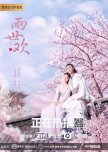
This review may contain spoilers
I will remember you, will you remember me?
This is a heart warming, unabashedly tropey love story about how true love conquers all. The OTP face a daunting obstacle: Feng Mianwan's (Chen Yuqi) mother is blamed for Jing Ci's (Yu Menglong) mother's demise. Nonetheless Jing Ci shields her from his revenge driven aunt and raises her as his companion/maid. They are childhood sweethearts but when he can no longer protect her, he finds a doppelganger, arranges for them to swap identities and doses her with an amnesia drug to forget him and their past. In her new identity Mianwan/Ah Yuan evades her (doppleganger's) engagement to the noble Mu Beiyan, dresses as a man and goes to work as a fledgling constable. In her new life, she grows into her own person and finds meaning in her existence. Her guardian angel Jing Ci joins her in a new identity as a county official and together they investigate criminal cases. They eventually stumble upon a larger conspiracy with ties to both their identities and extends to the highest levels of the empire.While this is mostly a lighthearted and fun love story, there is a sad undertone as Jing Ci's health is failing and he struggles to conceal his feelings for Ah Yuan. She does not remember him but falls in love with him all over again. His intention is to selflessly see her happily settled with someone who can expect to live a normal lifespan and who can protect her but who is he kidding? Love is never ultimately that self-less! Both characters are strong and intelligent and have an enjoyable rapport with the other couples; confidantes and allies who help them unmask their enemies and reveal the secrets of their past. I particularly liked the princess who is a fantastic and loyal friend with her own rather charming love story.
There is broad consensus that Yu Menglong's Jing Ci deserves an award for best characterization ever of a plank. Although the character is supposed to be unwell, in pain and stoic, he impressively took being plank-like to a whole new level. He has this amazingly eerie ability to seem deathly still and expressionless while speaking or in motion. Given the excoriating feedback, I feel a bit bad for the actor who clearly over-intrepretred the character and was also probably camera shy the way his eyes avoided the lens the whole time. To be fair, there were the rare one or two scenes when Jing Ci's feelings for Ah Yuan overcame him that were well acted though far from squeal-worthy. The one saving grace is he and Chen Yuqi make for a very stunning and romantic looking couple. Am a big fan of Yuqi who has really honed her acting skills and was convincing as a smart and independent minded character who knows what she wants and is not fooled or daunted by Jing Ci's seeming indifference. I really appreciate this smart and strong female lead character who is not obnoxious or dislike-able, which is more than I can say for several similarly themed 2020 releases. She is a total delight from her remarkable ability to absolutely adore her plank to her subtly comical eye rolls at Mu Beiyan's ridiculous overtures. And no, I never shipped her with Mu Beiyan - her Ah Yuan is way too capable for a dilettante and (nice) dufus like that. While Mu Beiyan is a well written, likable and much better acted character, I still find it impossible to ship a love rival who is better made up and coiffed than the female lead!
The story overall is not terribly original but the cases are interesting enough. You will not win armchair detective of the year if you spot the bad guys early on or unravel the conspiracy on your own. Some of the plot twists are a bit lazy but the characters are quite colorful and stop short of being too archetypal. The ending was well done, wraps up most loose ends and delivers a final and very satisfying coup de grace. It won't rock your world but you won't have to retreat into the fetal position to get over a gigantic slump after it ends either. I would have rated this higher (7.5/8.0 ) if Yu Menglong's performance managed to improve towards the end.
Was this review helpful to you?

Abs-olutely Fabulous!
I rarely watch modern romance dramas but the lure of a mystery piqued my attention. And within minutes, I was sold at the first eyeful of Tsao Yuning's absolutely fabulous abs. Yes, this is one of those dramas that makes me embrace my shallow self. Because this dude is one sexy beast with the kind of tanned, toned, intensely masculine smoking hotness that reduces me to a speechless, foolishly grinning, puddle of drool.Five years ago, aspiring actress Ruan Nianchu is at the wrong place at the wrong time and falls headlong into a hairy situation. She falls for a dangerous stranger who saves her life, evidently at the cost of his own. A hopeless romantic and optimist, she can't forget him and looks for him in countless blind dates. He reappears with a hidden agenda as Li Teng, as mysterious, intimidating and possessive as ever. The air literally sizzles between this couple who are now my gold standard for onscreen chemistry. There is no mistaking the intense longing and physical attraction between the two. The slow build up to the kiss scenes that usually starts with him invading her personal space and circling her is very hot. And yes, they go all in for the kisses, there are no birds involved. Its a good thing this is only 16 episodes cause my TV was in danger of burning out from the heat even with my air-con cranked up to the max.
I really like the way each episode opens with a flashback that reveals a bit more of the backstory. It is very effective in establishing the depth and substance of the feelings between Li Teng and Ruan Nianchu very early on and it adds to the sense of intrigue around what happened 5 years ago. Underneath it all, the plot is simple but fast paced and interesting even though it does have an its been done before feeling. The villains have rather boring motives and the final villain is revealed the moment they are dropped into the plot which is a bit clumsy.
I found the second couple to be a sheer delight. At surface they are a bit cliche but the kid is hilarious and mixes up their story in a good way. And Li Teng's camaraderie and loyalty to his sexy Men in Black like team of operatives is both cool and heartwarming at the same time.
Overall I rate this very entertaining watch an 7.5 even though its unlikely to turn me into a fan of this genre. I must confess that if Tsao Yuning flaunted his magnificent chest and fab abs just a few more times, I would have abandoned all standards and slapped one of my rare 10.0s on this one. If nothing else, I had several lbs of water weight loss from all that drooling.
Was this review helpful to you?

If you build it they will come.
This is a story about the Chinese dream. It is vivid, it is visceral, it is unflinching, it is moving; it is about community, sacrifice and bold dreams. It is not a fairytale.As part of the government's fupin 扶贫 or poverty alleviation program, an impoverished village in Xihaigu, one of the least inhabitable regions of the land-locked Ningxia province, is to be resettled in Minning Town, a brand new settlement several hundred kilometers away on the edge of the Gobi Desert. Young Ma Defu, a fresh graduate and junior cadre member is tasked to convince the stroppy, irascible and rightly skeptical inhabitants of his home town to abandon their ancestral homes for the freaking Gobi desert!!! The hostile, savage and utterly desolate beauty of the terrain is stunningly captured in an arid, sun soaked and brilliant palette that immediately conveys the daunting enormity of the task ahead. The drama chronicles the immeasurable trials and hard won triumphs of Ma Defu and his team of dedicated experts who together with the intrepid, early settlers, had conviction that if you build it, they will come.
For a flag waving fupinju, this drama does not shy away from criticism - the sheer boldness and absurdity of the effort to tame the Gobi and how poorly planned and under resourced the initial effort was, the bureaucratic impediments, numerous setbacks and mis-steps, misguided policies, self serving and corrupt politicians are all scathingly laid bare while remaining focused on the main characters. Because first and foremost this story is about real people, mostly peasants who even when they are stupid and myopic, they are compellingly relatable - everybody has an aunt or an uncle or a neighbor or knows someone who is just like that. They are true backbone of resilience and endurance upon which the Chinese dream is built upon. This is the kind of drama that usually has me rolling my eyes, but in this case, practically every episode managed to move me to tears.
The standout character among the all-star cast of rivetingly portrayed characters is Rayzha Alimjan's haunting and inspiring depiction of Li Shui Hua, an ordinary peasant for whom the poverty alleviation program didn't come soon enough. Like many of the villagers, her name contains the character shuǐ 水 because water is such a scarce commodity that any name containing 水must bestow luck on the owner. But alas, her dreams are worth less than the price of a donkey and misfortunes befall the young Shui Hua. But this woman just rolls with the punches and nobly soldiers on, retaining a kind of inner joy, optimism and dignity that radiates from her dusty, sun burnt skin and labor torn body. When her dreams elude her, she moves on and sets and works toward new, more realistic goals. It is most fitting that the man with small vision tries to build her a well while the man with great vision builds her a dam. This is by far, the strongest, bravest, best written female character I have seen in c-drama. As for the actor, she was pretty great in Longest Day in Changan but this is her memorable, hopefully award winning performance.
As much as I enjoyed every moment of this drama, it took me an incredibly long time to watch it. This drama is not over dubbed and the characters speak a local Northwestern dialect that I initially struggled to understand and I really dislike reading subtitles. But I got used to the dialect after the first 8 or 9 episodes and after that I embraced the lively and colorful proliferation of local dialects. There were many hilarious lost in translation moments where the villagers struggled to communicate with experts from Fujian (a southern province) who were sent to help create a mushroom industry in their non-existent local economy.
If I must criticize, I think the drama is a bit too short and some of the time jumps at the end skip important moments in some of the characters' lives that I cared about, especially Defu. And I admit that the ins and outs of mushroom farming was too vivid and a bit too much information for me - I will never quite be able to enjoy mushrooms with the same relish again. That said, if the Ningxia vines are as resilient as the people, we may one day see some vintages of Ningxia wines that give their Bordeaux and Burgundy peers a run for their money.
Like most, this kind of genre is not my usual cup of tea. But this one is different - as a product of Daylight Entertainment, it is as close to a masterpiece as something of genre can be. It is marvelously well written and gorgeously shot, not at all dry or heavily bogged down by propaganda. At the same time, it really brings to life not just how China lifted 750mm people out of poverty (as defined by the World Bank) since 1990 (the beginning of this drama) but WHY they absolutely had to do it. It is an unprecedented achievement in the history of the world and this drama truly tells the story in a way that does it justice - from the perspective of ordinary people. Even though overall I rate this a 9.0, in many places and moments, it feels like a 10.0.
Was this review helpful to you?

It is twice the pleasure to deceive the deceiver.
This Chen Kaige production more than lives up to its pedigree with a fresh and intriguing plot, unforgettable characters, eye popping visuals and costumes and movie quality production values overall. It is the rare Chinese drama that delivers a hefty and completely satisfying wow factor at the end that actually exceeds the exciting, high octane start. Unlike most Republican era dramas, this one is not at all just plain depressing and yuck.On his way home, fresh graduate Hua Minchu (Oh Hao) finds himself entangled in the affairs of the Eight, a vast and powerful jianghu alliance representing eight professions or guilds (spies, sages, mechanics, deceivers, thieves, assassins, poisoners and entertainers). The Eight guild masters have been long awaiting the emergence of a new leader (their Holder) to help them "go legitimate" by disbanding and exiting the grey underworld economy to become upstanding and productive members of society. But this is easier said than done as different factions emerge and other forces plot to seize power and unlock the secrets of a fabled magnificent treasure.
This drama bursts with colorful and multi-faceted characters from the most banal to the most divine; the most loyal to the most diabolical; the most compassionate to the most deadly and the most transparent to the most deceptive. While Oh Hao's Hua Minchu is clearly the lead and very well acted, this drama is about teamwork and the entire idiosyncratic cast steals my heart. All of the guild masters are legends unto themselves; each bringing an unmatched skill to the table that complements the skills of the other masters. Both good and bad are so dynamic, bad ass and so utterly awe inspiring it is literally a gangster's paradise. I love that this drama is about a team that works together, loves together, rejoices together and mourns together - the sum of the parts is greater than the whole. It is big fun to watch such impeccably well acted character dramas like this that doesn't just focus on one lead character. That said, I must admit that Oh Hau/Hua Minchu is delicious! He is a man's man - tall, tan, charismatic and ruggedly handsome - unlike the super androgynous, pasty white faced effeminate male leads we see too much of. He is not the best fighter nor does he always make the best decisions but he is clever and dang - he is way too sexy for whatever outfit they pour him into! I watched this through what I (mistakenly) thought were gaping plot holes just to savor his effortless charm and masculinity.
The villains in this show are very good villains - just as deadly, well resourced, smart and cool . Among others, our heroes are pitted against main villain Fang Yuanji, a viciously brutal, steroid enhanced lean mean killing machine and a shadowy mastermind with an opaque agenda. I had my heart in my mouth every time the Eight engages in hand to hand combat with Fang Yuanji and all their encounters are shockingly consequential. I don't think I need to elaborate on the visual virtuosity of action scenes produced by Chen Kaige - and in truth I don't have the words to do them justice.
From the start, I saw this as a character drama and did not have high expectations in terms of plot so I was wowed when it actually delivered. The story is tightly written and the plot unfolds at an exciting pace with enough conspiracies, twists, angst, betrayals, manipulations and manifold adventures within the well constructed and engaging arcs. However, it is not that easy to develop believable romance threads within such an action packed and heavily character laden story. As such, the romance between Minchu and Xishui (Tan Songyun) was not convincingly developed and it was quite obvious that many of their scenes were cut. That said, they still had good chemistry and Tan Songyun is always adorable, she just seemed to have been dealt a bit of a raw deal on her scenes. I don't enjoy triangles generally but in this case, it is handled very well and turns out to be actually relevant to the plot. In the middle, plot holes emerged with key actors making uncharacteristic decisions that had me rolling my eyes. And then in the final two episodes, I realized I was fooled - everything makes sense and every major loose thread comes together in an EPIC showdown and an exhilarating finale that will leave you thrilled, agonized, shocked and completely and utterly pleased by the way the deceiver is deceived. This is the one drama I have seen this year with a truly strong finish and it is the way dramas should end - shortly after a thoroughly satisfying climatic peak.
Make this the next drama you start. You can thank me later. My 8.0/10 rating would be higher were it not for the cut episodes and the somewhat weaker romance arcs.
Was this review helpful to you?

Creation of the Gods Ⅰ: Kingdom of Storms
21 people found this review helpful
Sons of a tyrant.
Wuershan's Creation of Gods trilogy is the culmination of an eight year labor of love that is the most ambitious and grand scale adaptation of Chinese classic Investiture of Gods ever. This Homeric, often chaotic tale of gods, demons and men that blends speculative history with myth and legend is probably the most widely adapted ancient Chinese vernacular novel. This grandiouse, exhilarating, action packed, and painstakingly crafted production is a visual triumph and an immersive adventure that is best experienced on an IMAX screen.Kingdom of Storms is the first instalment that focuses on the origin story of the King Zhou of Shang and how he incurred the wrath of the heavens to the extent the gods intervened. In a departure from canon, this adaptation does not lay the moral decay of King Zhou solely at the door of the hedonistic, fox jezebel Su Daji. This version holds King Zhou accountable, clearly asserting that his ambition and moral flexibility already put him on the dark path from the get go. This is a more layered and manipulative King Zhou, who adopts all of his noble hostages including Ji Fa as foster "sons". He ruthlessly indoctrinates his own son Yin Jiao as well as his hostage sons into choosing to be sons of a tyrant over their own fathers. All of the sons are pushed to decide whose son they really are and what kind of man they wish to become. This recurring theme of conflict between father and son and right and wrong adroitly weaves most of the sub-plots together.
Kris Phillips with his magnificent build and his imposing, quietly menacing , almost mesmeric screen aura is impeccably cast as King Zhou. He so much looks and breathes the part that it is easy to ignore his at times bizarre Mandarin and the occasionally stiff acting. Although the stunningly gorgeous Naran is bewitching as Daji, the role lacks complexity. She doesn't get to do much more than alternate between a sensuous seductress and a cunning and feral animal spirit when cornered. This debouched couple lights up the screen with their dark chemistry but I could have done with a bit less of their wanton cavorting that comes off as too unsubtle Hollywood. Beyond their honed physiques and stunning atheleticism, both Yu Shi's Ji Fa and Chen Muchi's Yin Jiao won my heart with their brotherhood and their portrayal of initially bewildered and disillusioned sons who grow up to become fearless and resolved men. They stand out among the dazzling number of up and coming young actors who managed to make an impression in this whirlwind production as does Ci Sha's not so hot headed Yang Jian. The deities don't feature as prominently in this first chapter but I much enjoyed this first glimpse of the diabolically mischevious Nezha.
For those unfamiliar with the chaotic original works, the storytelling may seem cluttered with vignettes at the cost of plot advancement as this largely sets the stage for what culminates in the battle of all battles between good and evil. Beyond an almost gratuitous amount of wildly, intense action scenes, the narrative pays homage to key features of the original works from Ji Chang's meat pies to Bi Gan's seven chamber heart. It culminates in Ji Fa's hair rising escape from the Shang capital Zhaoge. Keep watching after the credits roll as the following epilogue sets up the next instalment where hopefully we see a lot more plot movement. This is a very difficult and messy novel to adapt but so far, I am very impressed with how cogently and fittingly everything ties together. This promises to be the best adaptation by a long mile of this well loved novel, the first part of which warrants a highly enthusiastic 8.5/10.0 from me.
Was this review helpful to you?
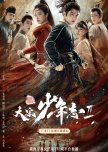
The father, the son and the holy sheep.
After a long hiatus, Young Blood 2 picks up right where Season 1 left off with the team heading to Western Xia to rescue Zhao Jian's father. There they get embroiled in a plot to assassinate Yuan Hao, aka Emperor Jingzong of Western Xia. Yuan Hao was a formidable general and founder of the Tangut dynasty, which lasted almost two centuries. This narrative largely respects history so if you do not want to be majorly spoiled as to how this ends, resist the urge to Google him.Initially, Season 2's somber, pensive tone took me aback. But it is fitting for the desolate, rugged, mystical Helan Mountain terrain. It also ties well with the personal losses, betrayals, and disillusionment the team experiences at the end of Season 1. While screenwriter Wang Juan's humor and clever dialogues are evident in the writing, the difference in the directing team is noticeable. Character shots and comedic moments are not as well captured by the camera. Many of the people shots are not filmed at interesting camera angles and the main cast's humor does not flow naturally. The actors may be trying too hard to convey that some of their joie de vivre have faded after all that they've been through. Their energy often seems lethargic and their banter is lackluster despite the witty dialogue. What still shines is their unspoken affection and trust in each other which seems more mature, time-tested, and unbreakable. The "new" Yanei integrates well even though he unavoidably looks younger and is missing the swagger. Su Xiaotong's acting has most visibly improved and I enjoyed Pei Jing's growth this season.
In terms of comic relief, the antagonists steal the show in Season 2. The humor in their dialogues, the bald-faced lies traded with deadpan expressions among the Western Xia royal family had me in stitches. But it is the oddly gullible, absurdly superstitious, and unexpectedly sincere Yuchi Yuan that made me laugh hardest only to cry hardest when he admits he is someone that just needs to believe in divine intervention. Many supporting roles like Yuchi Yuan, the heroic Section 8, and the antagonists are so well written and dimensioned that they are the show stealers. Not only does Section 7's banter seem to lose its mojo, they also don't get to do the important tasks in the mission, other than show up for the finale. Indeed the main architect or spymaster is not from Section 7.
This season, most of the main characters grapple with the kind of person their father is, what he expects of them, and whether that is compatible with who they want to be. To different degrees, each parent and child take a measure of one another and don't quite like what they see. Yuan Zhongxin's dad may be a particularly nasty, cold-hearted, and misguided sociopath with questionable methods; but ultimately he wants his son to survive. This is not the case with Yuan Hao, who is the biggest, baddest, daddy of them all. Thanks to Hai Yitian's intimidating screen presence, Yuan Hao is a terrifying freak of nature, a giant rock formation that must have been hewn out of the sacred mountain itself. Just his menacing, diabolical appearance made me break out in cold sweat. Yuan Hao knows exactly what his son is up to and he gives him every opportunity, practically dares him to succeed. The dialogue within the dialogue and the dark humor behind barely veiled threats that petrifies poor Ningling Ge out of his wits is signature Wang Juan. I never felt more sorry for such a vile and duplicitous character; an apple that falls far, far from the tree. He seems diminished and less smart in Season 2, over-shadowed by the larger-than-life Yuan Hao. Father and son are both oddly pitiful to me as their story as recorded in history is already wildly dramatic and treacherous.
The plot is tighter and more focused than Season 1 because there is only one mission that spans several years with a time jump that interrupts the momentum slightly. The sub-plots are cleverly structured around the interplay of recurring themes around the father, the son and the holy sheep. At the time, the Tanguts practiced folk or natural relgion steeped in mysticism with shamans, and many spirits or gods. Like many ancient cultures, they believed that the ruler is divinely blessed but in times of chaos or natural disaster, can lose the mandate of heaven. In planning the mission, the yummy Wen Wuqi of Section 8 infiltrates Western Xia by assuming the identity of a sheep deity's envoy come to anoint Yuan Hao's regime. There are many allusions to fēngshén/封神 or the creation of gods, which is the underlying strategy the Song spies use initially to elevate and then subsequently to undermine Yuan Hao. Wang Juan's well researched and superbly written script clearly draws inspiration from Fēngshén Yǎnyì 封神演义 or The Investiture of Gods one of the great vernacular novels about Chinese history, mythology, folklore, fantasy and legends.
The ending will not come as a surprise to anyone who knows the history (or used Google). Even then, the finale delivers an epic showdown that the entire season builds up to. The fast paced and thrilling action choreography is one of the highlights of Season 2. The desperate, bloodthirsty and stunning final fight had me squealing, jumping up and down and bouncing off walls with adrenaline fuelled fear and excitement. I personally would have ended the story at the mid-way point of the final episode, where the ending credits roll. It is fitting and exactly the kind of irony, cynicism and dark humor I expect of Wang Juan. But that would have resulted in an outcry of gargantuan proportions and I equally enjoyed the final message that a father does not have to explain himself to his son. Despite the fantastic writing, I still wish the original team's chemistry worked a bit better. So for me, this was mostly tracking just a bit better than an 8.0/10.0 but I think ending a drama well is super important and I like the ending so much so I am happy to bump this up to an 8.5/10.0.
Was this review helpful to you?

An appealing lawyer.
Chen Tumi grew up studying the Tang legal code with her mother's handwritten notes. It was her only link to her dead mother. When her father is wrongly indicted for a crime, she defies convention to defend him in court. She is an appealing lawyer both literally and figuratively. Her determination, intelligence, and logical arguments catch the attention of powerful actors including Crown Prince Han Wuwei and Kang Zhengyuan of the powerful Dali Temple (judiciary). She is quietly aided by the mysterious Ye Cha.Similar to the Justice Bao stories, the legal cases in Ms. Chun is a Litigator deal largely with the common people. The cases are quite engaging and easy to follow with well-written and satisfactory outcomes. The court arguments are livened up by the amusing and friendly rivalry between Prince Han and Official Kang. While it is a bit of a Mary Sue kind of setup where everyone falls for Tumi, this funny and lighthearted quadrangle never gets annoying. Tumi is such a breath of fresh air - although she is young and inexperienced, she is clever and logical. She is able to seek and accept help without seeming weak or coming across as a damsel in distress. I am pleased to come across this very natural and charming young actress Zhang Dafei who has many interesting roles in upcoming dramas. The bromance and hilarious banter between Han Wuwei and Kang Zhengyuan is another very entertaining aspect of this drama. I checked this out because of Huang Junjie and found myself delighted and entertained by the chockfull of eye candy that makes up the charismatic young cast.
This drama's greatest shortcoming is that there are obviously many cut scenes or arcs. This affects how the larger conspiracy unfolds and leaves open some plot points. Some of the character and relationship development also feel uneven. Both Kang Zhengyuan and Ye Cha are well designed personalities that didn't get fleshed out enough. I would have liked to see Tumi interact more with Zhengyuan as he shows her the ropes in terms of judicial process. While saved by the clear spark of attraction between them, Tumi's relationship with Ye Cha seems to advance too quickly. Finally Wuwei's persona appears to take a baffling darker turn towards the end. While this wraps up well enough, there are enough unanswered questions and open plot points that beg for a second season. I would rate this higher than 7.5 were it not for the fact that it leaves a slight unfinished taste in my mouth, though not enough to ruin the drama. This drama is a lot of fun and the cast is simply a joy to watch. I am looking forward to season 2 but there is no need to wait to start this as it seems intended to be an ongoing episodic series.
Was this review helpful to you?

A hot and cheesy mess.
Though hardly original, this drama's switched bride trope is well executed and entertaining. A very shady prime minister marries his illegitimate daughter Shen Keyi to Wen Ye, a prince and the country's God of War posthumously. As it turns out, Wen Ye is very much alive and full of suspicion when he discovers himself married to his enemy's daughter. Meanwhile Shen Keyi is tasked by her stepmother to steal a jade token from Wen Ye in exchange for her beloved nanny's wellbeing. Their early antics are silly but very funny. It was great to watch an older and jaded general fall for a lively, natural and utterly beguiling young girl. The leads have good chemistry and both actors deliver convincing performances. I also enjoyed the comedic banter between Wen Ye and his two sidekicks.At twelve episodes this drama was hilariously hot and cheesy but by twenty-four episodes it turned into a hot and cheesy mess. The palace plot becomes increasingly convoluted and absurd and both lead's adorable silliness descends into stupidity and melodrama as they navigate multiple obstacles. Ultimately, the much simpler love story between the princess and the guard moved me more. The ending is a bit rushed but it was actually pretty good in the messiest way possible. All considered not the worst drama to watch to just pass some time. I rate it 6.5/10.0
Was this review helpful to you?
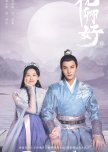
Pour some sugar on me.
This is one of those delicious "pour some sugar on me" romance dramas where you just have to go with the flow and not be a prude. It is best watched gasping for breath on the treadmill trying to break a 9-minute mile. With a shortage of air to the brain, you will easily filter out the small stuff like how quickly they fall in love, whether she has hormonal issues, if she is schizophrenic and other logic or character gaps and focus on the only thing worth getting hot and bothered by, which is how hot the two male leads are.Liu Ling is the most improper Princess Changle; a hoyden who does as she pleases without regard to social conventions. When commander of the embroidered guard Shen Yan crosses her path, she takes an instant liking to him and pursues him with reckless abandon. I find the sheer audacity of her shameless overtures to him absolutely uproarious. While this may sound wanton and unseemly, it is a very original and refreshing way to write a female character. More importantly Yuan Bingyan pulls it off so engagingly and inoffensively she deserves high praise for such a controversial characterization. I understand that in the novel (which I did not read), Liu Ling was deeply troubled by her traumatic childhood but a lot of that got cut out of the drama, which unfortunately makes her actions at times seem capricious and maddeningly inconsistent. As it turns out, she becomes a pawn in a high stakes power play between multiple states with links to an old conspiracy that brought down her best friend Xu Shijin's family. Can the Shen brothers, both dashing embroidered guards untangle the web of old lies and win the day?
I was swooning the moment I spied Zheng Yecheng on the cast list; throw in Merxat and it is just like a double upgrade from economy to first class. But I had reservations over Yuan Bingyan, whom I found lacking in Love and Redemption. As it turns out, she has fabulous screen chemistry with Zheng Yecheng and delivers a winsome and hilarious performance as Liu Ling. As for Zheng Yecheng, he must be the ultimate ideal of the romantic hero with his brooding deep stares and overwhelming masculine beauty. This is a not to be missed opportunity to evaluate his reputation of being the best kisser in c-dramaland. Its all, ahem... research on such an important topic to womankind. And let me just say that the kiss scenes were so scorching that evidently a bunch of them had to be cut out. That said, it is quite dismaying to see Zheng Yechen becoming typecast in these sorts of roles. He is a fantastic actor that deserves a shot at more complex roles.
Merxat is another fine actor that just doesn't seem to get enough good roles. He has great rapport with Zheng Yecheng and I had to reduce the speed on my treadmill whenever the Shen brothers shared scenes to properly drool over their combined hotness. I find Shen Yu and Xu Shijin's storyline more interesting probably because it is left largely intact by the censors. Shen Yu and Shijin are both so intelligent and just such a marvelous couple from the way they solve problems together and go all out for their friends and family. I root for them more because their romance faces a giant obstacle that is difficult to overcome without deep consequences. Despite the obvious cuts, there is clearly a well written story with some depth behind it. The over-arching conspiracy and the sub-lots that feed into that are all well written and unfolds at a very nice pace. This is overall a very well produced and high quality drama despite some odd edits and clear impression that some things were left out, notably with Liu LIng's backstory. It would not be fair to rate it that highly for that reason so this is a 7.5 for me but I find is as enjoyable as many dramas I rated 8.0/8.5.
Finally, while Yuan Bingyan is not one of my favorite actresses, she really shines in this drama. How she was essentially cold shouldered for changing agencies is disgraceful and I am so happy that for once, c-drama fandom did the right thing by her by supporting her. Kudos to Zheng Yecheng and the rest of the cast as well. They acted their hearts out and it shows - it is no hardship, indeed it is a pleasure to watch and support this drama.
Was this review helpful to you?

Buns of Steel.
Blossoms in Adversity / Xī Huā Zhǐ/惜花芷 is the story of superwoman Hua Zhi's feel-good romp through feudal China. When Imperial Censor Hua dares to criticize the monarch, he is exiled along with all the men in his family. A bevy of helpless women and young children are left to fend for themselves. Hua Zhi takes charge and rallies the women together to triumph against overwhelming odds. When she flexes her buns of steel, no feat is beyond Hua Zhi! She parleys a candied hawthorn business into a pastry and restaurant empire, picks up stray royal children, foils a few palace plots, build schools and a canal, rescues the Hua family men and even manages to find time to fall in love! All in the space of a 2-3 years!!! Phew! Even superwoman would surely stagger from sheer exhaustion!This narrative paints a distressing picture of how oppressive life was for women in hierarchical ancient Chinese patriarchal society. The best part of this drama is how in order to survive, the women defy social conventions, set aside petty differences, learn to trust each other and work together towards shared goals. While the sheer scale of their financial and other achievements are preposterous, there is something very cathartic and satisfying about how flamboyantly they flourish. The storytelling is squarely centered on Hua Zhi and speeds through many of the supporting character arcs, leaving their motivations and struggles under-developed. This is a pity because family dramas like this are most compelling when important supporting characters are given enough agency to be the main characters of their own arcs.
This is one of those dramas that is best enjoyed superficially and with heavy suspension of disbelief. Upon closer scrutiny, the overarching empowerment theme is contradicted by some of the sub-plots. I was disturbed by the different treatment of domestic abuse in Hua Jing and Hua Xian's case. But what I disliked most was what happens to Hua Rong and her child. It is as if she learned nothing from her family's struggles about resilience in the face of adversity. There are a few poorly developed sub-plots like this that the writers raced through without thinking carefully about the messaging.
As much as I like Zhang Jingyi, this is not her best role. Her interpretation of Hua Zhi is too perfect, too calm, too understanding and too reasonable. This has led to many Mary Sue comments about the character. But Hua Zhi is actually written to have many flaws - she can be over confident, she cannot mind her own business, she is reckless and like her grandfather, she cannot hold her tongue. In the canal arc, she is the architect of her own downfall but because everyone unites around her, she never suffers any consequences for her actions. This character has too much plot armor and is already so smart and capable that she shows virtually no growth from beginning to end.
Hua Zhi's relationship with Gu Yanxi is similarly whitewashed to the extent that it appears too ideal to be true; it lacks passion, conflict and intensity. Hua Zhi lets Gu Yanxi off too easily for deceiving her in the beginning when any normal person would be at least a little bit angry at him. She also never communicates any discomfort with his role at the Security Bureau; indeed she seems quite happy to use his authority there to serve her purposes. Thus, it came as much as a surprise to me as it must have to Yanxi that it could be a deal breaker for her! So much for their so called mature, open and communicative relationship! I don't know why young actors like to make their characters so perfect all the time and have such a hard time embracing more complex but perfectly natural human relationship dynamics and emotions.
Hu Yitian delivers a more nuanced portrayal of Gu Yanxi as the emperor's sharpest knife. His fight scenes are phenomenal and he is menacing and ruthless as the commander. He shows us he is a different person; more open, at ease and happier when he is with Hua Zhi. While this is one of Hu Yitian's better roles to date, he shies away from showing us the true extent of his affection for the emperor and his inner conflict. This is a missed opportunity because Hai Yitian delivers a compelling portrayal of the lonely, paranoid and manipulative emperor. Because Hu Yitian's portrayal of Gu Yanxi does not meet him halfway, the emperor's affection for his nephew comes across as borderline obsessive and a lot more one sided than it really is.
Even though it seems her character Shaoyao is dumbed down from the novel, Lu Yuxiao is once again a scene stealer in this drama. This kind of beguilingly innocent, simple minded savant kind of character is extremely difficult to portray well but Lu Yuxiao pulls it off brilliantly. She doesn't get enough screen time to steal the show but I was more invested in her character than I was in Hua Zhi who is too perfect to be relatable.
The ending of this drama really cracked me up. It is one of the few times that the villain actually saves the day by doing what Hua Zhi and Gu Yanxi could never have done. Although it is also possible that Gu Yanxi learned his lesson not to look for needles in hair stacks and had the good sense to show up a just a tad late at the ceremony. Despite some flaws, this is a very appealing feel-good drama for those seeking light entertainment. My rating 8/10.
Was this review helpful to you?

The Virtuous Husband.
In this witty satire, a modern business man finds himself in ancient China where he is Ning Yi, a soon to be zhui xu/赘婿 or matrilocal husband to Su Tan'er, the heiress of a wealthy cloth merchant. Using modern business methods, he hilariously wins his Tan'er's heart and mind as they take down internal and external rivals together and he proves his worth beyond being a useless kept man.The wicked role reversals as Ning Yi and Tan'er navigate their marriage made my shoulders quiver with laughter, especially the darned Academy of Male Virtue. I love the way Ning Yi is written in this drama - he is cunning, compassionate, innovative, ruthless and far from the virtuous husband, he is the academy's most farcically subversive element. Guo Qilin and Song Yi sparkled together, transitioning seamlessly between brilliant comic timing and repartee, heart stopping action and moving emotional moments. The colorful ensemble characters, friend and foe alike are well dimensioned and written and acted with verve and audacity. The humble Guard Geng with a big heart and big dreams is my favorite supporting character.
I thoroughly enjoyed the first half of this drama, which is easily a 9.0+, the second half is noticeably loses its mojo and is at best a 7.5/8.0. The decision to back burner both Tan'er and Guard Geng would have been fine if comparable new characters stepped up to fill the void. Unfortunately while Xigua starts out as a powerful and interesting character, she becomes pathetic. It does not help that while she is lovely and likable, the actress Jiang Yiyi is miscast here - she not funny and has little chemistry with Ning Yi/Guo Qilin. Ditto for his shifu and the creepy Lou Shuwan; I didn't really see the point of either character. The drama only picks up again when Guard Geng and Tan'er re-emerge and our power couple is reunited. This makes it obvious that despite Guo Qilin's undeniable talent, he cannot pull off these uproarious moments when he is not lined up with the right team.
Similarly, the antagonists in the first arc are very comical but in the bandit arc, the villains were mostly trying too hard to be humorous caricatures. The attempts at comedy are also often at odds with the heavily political and increasingly complicated plot line, one that leaves scarce room for Ning Yi the maverick to save the day. The story also takes a darker and more cynical turn and even though Guo Qilin impresses with his ability to make me feel the weight of his loss and cry alongside him, the drama ends in a way that does not leave me thirsty for the heavily hinted season 2.
Overall I rate this a 8.0. I would recommend dropping after completing the much more outstanding first arc.
Was this review helpful to you?

Who's your daddy?
Destined is a story about how an unlikely couple discovers themselves and each other and survive turbulent times together. Liu Yuru has been auditioning all her life to be a worthy wife to the finest young gentlemen in Yangzhou. To her aghast, she finds herself engaged instead to Gu Jiusi, the scandalous scion of Yangzhou's wealthiest family. Gu Jiusi is no less dismayed to find himself shackled to such a paragon of virtue but he is chastened by his careless prank that got them in that situation. They hilariously find that they are actually well suited and the sum of their parts is greater than the whole. The first arc is by far the best; it is funny, romantic and underpinned by genuine chemistry and rapport between Song Yi and Bai Jingting.The couple's newfound bliss does not last as the country is swept into chaos as civil war breaks out. At their loss of influence in the capital, the Gu family is forced to flee Yangzhou for Youzhou far to the north. There they are still inevitably caught up in the war and ensuing political upheaval. Meanwhile, in the shadows, a hidden mastermind plots their downfall at every turn. There is a marked dark tone shift in the drama as it delves into the political arcs in the latter half. This drama explores the - "Who's your daddy?" question and whether it matters. All of the main characters have bad dads to different degrees; overly-indulgent, indifferent, overly-judgemental, negligent, wilfully blind and missing in action. Most of them are no worst for the wear but others allow their resentment to get the better of them.
This is a very entertaining drama despite that the second half is sloppily written and ridden with logic holes. The source material evidently had more substance and depth but the drama adaptation falls short on multiple fronts. The plot and character designs don’t make sense without novel readers to help connect the dots (see @CloudA’s discussion threads). The best written parts include most of Jiusi and Yuru’s arcs and humorous moments. The political arcs have too many logic gaps and farcical sub-plots that undermines the intelligence of allegedly smart characters. The writers have a very superficial understanding of history, politics and inner palace protocols. It is mystifying why the Dowager Empress does not secure the position of crown princess for her daughter in exchange for her support. Instead she uses up all her goodwill to try to foist her on a happily married man! The new emperor is so weak instead of banishing these harpies to the cold palace, he allows them free rein to bully his loyal court officials and interfere in official proceedings. He puts a known villain in charge of the crown prince's education when both Ye Sh'an and Gu Jiusi are obviously better choices. They forgot to tell us Luo Zishang has an invisibility cloak that gives him better access to the emperor's bedchamber than a favorite concubine! Game of thrones in this drama pretty means Pass the Throne (parcel). This kind of writing is why fluffy romance writers should stick to their knitting and not try to write about stuff they know nothing about.
What does make this drama work is phenomenal acting all around that papers over the lousy writing. All of the main actors are incredibly charismatic and blend into their roles so well that the portrayals surpass the character blueprints. This is especially true of Liu Xueyi's mesmerising ability to make the vicious, misguided and tragicomic Luo Zishang seem sympathetic even though his backstory and motives are not well explored and only fully revealed at the end. As a result, for most of the drama, this character comes across as a cardboard villain; a delusional sociopath that is just evil for the heck of it. Similarly Fan Yu's character evolution takes abrupt turns and his interest in succeeding his father is not well explained. Fortunately the good characters in this drama are far better written than the tired trope of villains who blame their bad behavior on their bad dads. Their motivators are not as forced and it is a lot of fun to watch the rapport, loyalty and friendships between them blossom so organically. After Jiusi and Yuru, Zhou Ye is my favorite character even though he can be a noble idiot. He just gets really hard things done and done right in the nick of time to save the day.
In the final arc, both Jiusi and Yuru are sidelined so that everyone else can do absurd things to let the villain easily get the upper hand. We are short changed of a satisfying final battle of wits between Jiusi and Zishang to make way for a very anti-climatic reveal of Zishang's backstory that devolves further into a maudlin moment of truth and reconciliation that somehow diminishes both characters.Along comes Zhou Gaolang to bravely re-take a city that was already in hand! There was a senseless, gratuitous death of a terrific character just to squeeze a few audience tears and to add insult to the injury, the perpetrator was unjustly sentenced to live the life of the idle rich. While many favourite characters got good outcomes, some of them deserve better and the final denouement fell flat and was anti-climatic This drama peaked too early at King Liang's epic siege and went downhill from there. The early arcs were an 8.5 for me but the back half was at best 7.0/7.5. Even though I can only rate this 8.0 overall, it is still a very enjoyable drama that is shored up by some fantastic acting. It is best watched tipsy or with your brain half switched off as the plot does not bear close scrutiny.
Was this review helpful to you?


 53
53 189
189 8
8



















